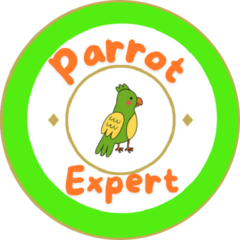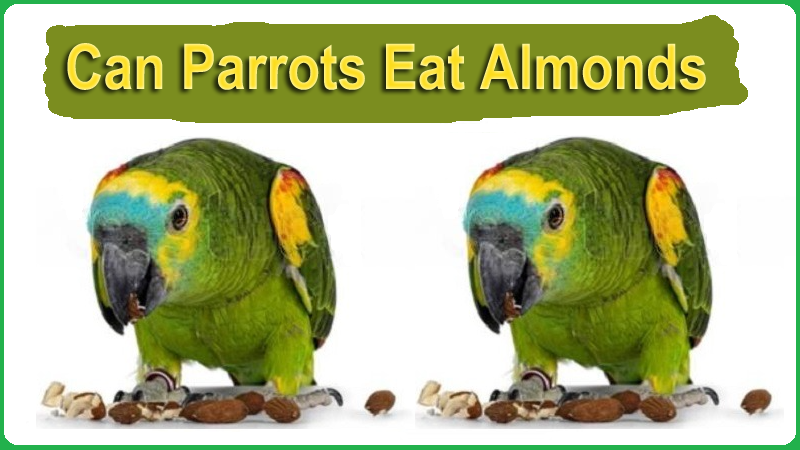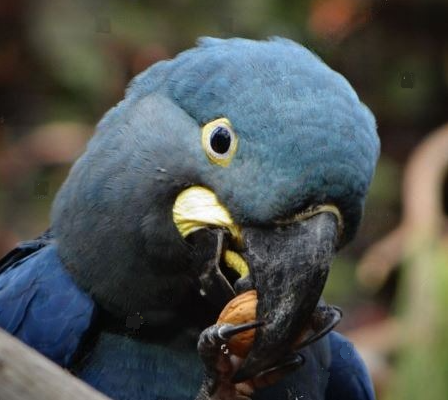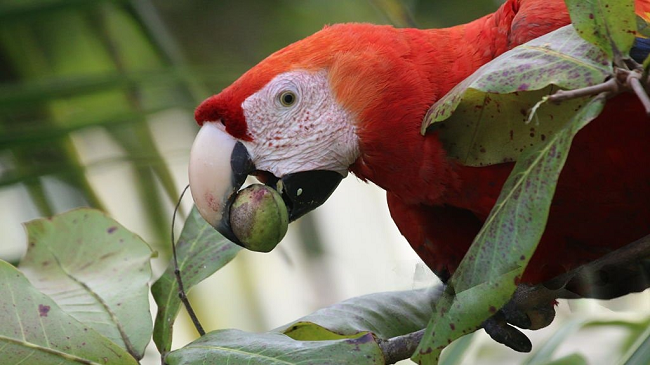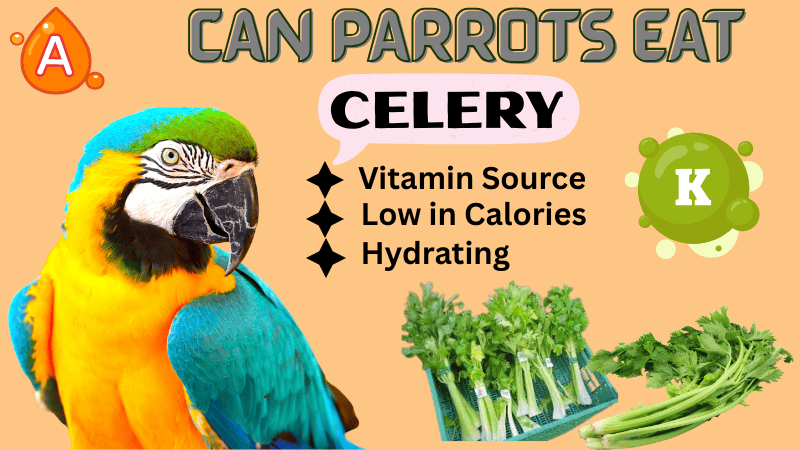Most of parrots like to eat all kinds of nuts and seeds. Almonds are well-known snack in among of parrots and human beings. Generally, people allow nuts to pet parrots as treats, because they are dry and small size. So, they can easily crack and munch them. Do you have wonder about ‘can parrots eat almonds’? Is it okay to give almonds to them? Keep reading it.
Your answer in short ‘Yes’! But, almonds should only be fed in moderation along with any other nuts. From this article, we will cover all possible stuffs regarding almonds for parrots like as potential health benefits, risks and feeding tips and tricks. Let’s come dive in!
Almonds have two distinct flavors as sweet and bitter. Bitter almonds are found as commonly, but harmful for your parrots. People always prefer to eat sweet almonds that are perfectly healthy.
Are Almonds Safe For Parrots?
Yes! Almonds are safe food for parrots when fed in moderation. Almonds consist highly essential nutrients like as vitamin E, magnesium, fiber, healthy fats, and protein that can beneficial for your parrot’s health. Keep remember, always feed them raw, unsalted almonds, because salted or seasoned nuts are dangerous.
Whole almonds can leas a choking hazard, especially for smaller parrots. So, you should to chop or crush them into smaller pieces. Besides of this, almonds give only an occasional treat and not a staple food.
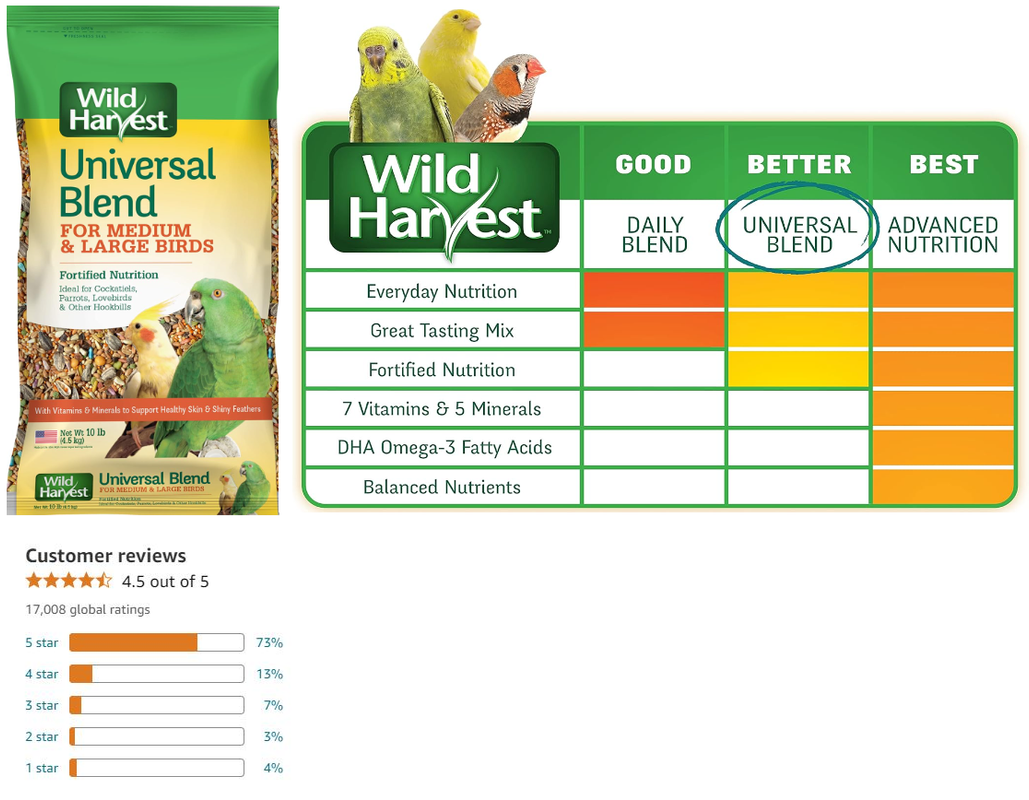
Introduce new foods, then feed gradually and always monitor at their every moments. You should take consulting with an avian vet before adding almonds to your parrot’s diet.
Benefits of Feeding Almonds to Parrots
Almonds can provide numerous benefits for parrot’s well-health. Here, we will detail look at the various advantages:
Nutrient-Rich Profile
Almonds are rich with beneficial vitamins and minerals that support a parrot’s overall health. Vitamin E in almonds found in high quantities that act as a potent antioxidant.
Also Read: Can Parrots Eat Blueberries? What You Need to Know
Magnesium in almonds is important for muscle and nerve function. As well as, almonds also contain calcium and phosphorus, both vital for strong bones and the formation and repair of tissues.
Healthy Fats
Almonds have rich in monounsaturated fats that are beneficial for cardiovascular health. These fats help decrease the bad cholesterol levels (LDL) and increase good cholesterol levels (HDL). Healthy fats are required for parrot for maintaining a shiny, vibrant plumage.
Protein Source
Almonds have high-quality protein that is necessary for muscle repair, growth, and maintenance of body tissues. Amino acids also need for various bodily functions of parrots.
This protein especially works for young parrots, because they need sufficient protein to support their physical activities and growth.
Antioxidant Properties
The antioxidant is most essential to give protection parrots from the damaging effects of free radicals.
Antioxidants also most beneficial in maintaining a robust immune system, then parrots away from fend off bad infections and diseases.
Digestive Health
Almonds also contain dietary fiber, which aids in digestion. Fiber supports to healthy bowel movements and prevent digestive problems, constipation is one of them. This also helps to perform parrot’s digestive system functions smoothly and efficiently.
Mental Stimulation
In the wild, parrots spend most of time foraging for food, including nuts and seeds. Feeding almonds to parrots can mimic this natural behavior that providing both physical and mental stimulation.
In captive parrots, it reduces the boredom and other associated behavioral issues. Chewing on almonds also helps keep their beaks in preventing overgrowth.
Almonds Nutritional Profile for Parrot
Here, we will show you a nutritional profile of almonds for you parrots:
Also Read: Can Parrots Eat Oranges? Benefits & Precautions
| Nutrient | Amount Per 1 oz (28g) Serving |
|---|---|
| Calories | 163 |
| Protein | 6 grams |
| Fat | 14 grams |
| Carbohydrates | 6 grams |
| Fiber | 3.5 grams |
| Vitamin E | 37% of RDI |
| Magnesium | 19% of RDI |
| Riboflavin | 1.1 mg |
| Phosphorus | 137 mg |
| Copper | 0.3 mg |
Potential Risks of Consuming Almonds to Parrots
However, almonds can be a safe occasional treat for your parrots, but there are some potential risks to be aware of:
Choking Hazard
Feeding whole almonds pose a significant choking risk, especially for smaller specie’s parrot. Parrot can be difficulties to chew and swallow of hard texture of almonds.
To reduce this risk, you should almonds chopped or crushed properly into smaller pieces. Feeding grinded almonds into a powder to smaller parrots is a safer option.
Aflatoxins
Like as other nuts, almonds can also sometimes contain aflatoxins that are toxic substances. Aflatoxins can major damage of your parrot’s lever.
To minimize level of this risk, always buy almonds from reputable suppliers who adhere to strict quality control standards.
Feeding organic almonds can also reduce the likelihood of aflatoxin contamination.
High Fat Content
Almonds are enabled highly fat that can lead to obesity and related health problems if consumed excessively.
Due to obesity, parrots can get fatty liver disease, major cardiovascular issues, and decreased lifespan.
So, you should offer almonds an occasional treat and not as a staple part of the diet. Always monitoring the parrot’s overall fat intake is crucial to keep away obesity.
Salt and Seasonings
Commercially almonds are generally salted or seasoned that can be harmful to parrots. Due to high salt, parrot can get dehydration, kidney problems, and high blood pressure.
Other seasonings and additives may consist chemicals or artificial flavors that can negatively impact on parrot’s health. So, you always choose raw, unsalted almonds to avoid these risks.
Allergic Reactions
Like as humans, parrots can also have individual sensitivities or allergies to almonds. Allergic reactions in parrots may lead to itching, swelling, respiratory distress, and gastrointestinal upset.
Always feed almonds gradually into the diet and monitor for any adverse reactions. Stop quickly feeding almonds and consult an avian vet, if you see any allergic symptoms.
Digestive Issues
We accept that almonds are in highly dietary fiber beneficial for digestion, but overfeeding can lead to digestive problems such as diarrhea or gastrointestinal.
How Many Almonds Can Feed Parrots?
Parrots can safely intake almonds, if give in moderation as an occasional treat. Therefore, its amount should be limited to keep away potential health risks. As per the experts, don’t give almonds more than 10% of a parrot’s total daily food.
This quantity is equate to around 2-3 almonds per day for most medium sized parrots. But, smaller parrot species should intake 1 almond or less. Almonds should be given in small, bite-sized pieces to avoid choking hazards.
Keep mind, whole almonds should not be given, especially for small sized parrots. Take consultation an avian vet is a good decision, especially for parrots with existing health conditions.
What Should I Do, If Parrot Intake Bitter Almond?
If, your parrot accidentally intakes bitter almonds that can contain toxic levels of cyanide, then you have to immediate take action:
Also Read: African Grey Parrot Diet and Nutrition in Captivity and Wild
First of all, eliminate any left bitter almonds from the parrot’s environment to avoid further consumption. Bitter almonds are darker in color that has a more pronounced almond flavor as compared to sweet almonds.
Next, always keep monitor parrot closely for signs of cyanide poisoning like as rapid breathing, lethargy, tremors, and seizures. Cyanide disturbs the bird body’s ability to use oxygen, so these symptoms can display quickly.
If you have suspect that your parrot has consumed a toxic amount of bitter almonds, then quickly visit avian veterinarian. As cyanide poisoning can be fatal if left untreated.
Prevent to access bitter almonds, because small amounts can be deadly for parrots. Stick to offering only sweet, raw almonds in moderation as an occasional treat.
How to Feed Almonds to Parrots Safely?
There are some feeding almonds safely steps to ensure their well-health:
Choose Raw, Unsalted Almonds: Always prefer to raw almonds without any added salt or seasonings that helps to minimize the risk of exposing your parrot to harmful additives.
Prepare Almonds Appropriately: Almonds preparation depends on the size of your parrot, chop, crush, or grind almonds. This step helps to avoid choking issue, essential in smaller sized parrot species
Moderation: You always serve almonds as an occasional treat instead of a regular part of their diet. Give almonds in limit quantity to a few almonds per week. But, adjust it at a based on your parrot’s size and dietary needs.
Introduce Gradually: Whenever you introduce almonds to your parrot for the first time, do serve gradually. You must be monitoring their bad response for any signs of allergic reactions.
Monitor Consumption: Keep an eye on how much your parrot consumes. Overfeeding almonds can lead to health issues due to their high-fat content. Ensure almonds complement a balanced diet that includes a variety of fruits, vegetables, seeds, and formulated parrot pellets.
Avoid Bitter Almonds: Never feed your parrot bitter almonds, because they contain toxic compounds. Give a priority to sweet almonds that are safe food for consumption.
Consult with an Avian Veterinarian: Before going to any major changes in your parrot’s diet like almonds, do consult with an avian vet. They will give some personalized guidance based on your parrot’s species, age, and health status.
What Nuts Are Safe for Parrots to Eat?
Here are some nuts that can be considered as safe for parrots to eat:
- Almonds
- Cashews
- Hazelnuts (filberts)
- Macadamia nuts
- Peanuts (monkey nuts)
- Pecans
- Pine nuts
- Pistachios
- Walnuts
Nuts to Avoid in a Parrot’s Diet
There are several nuts that should be avoided in a parrot’s diet due to potential toxicities:
Also Read: Can Parrots Eat Bananas? Yes or Not
Bitter Almonds: Contain cyanogenic glycosides which can be toxic.
Pecans: High in fat and can cause digestive upset.
Hickory Nuts: High in fat and difficult for parrots to digest.
Acorns: Contains tannins and other compounds that can be harmful.
Chestnuts: Can be difficult for parrots to digest and may cause gastrointestinal issues.
Processed or Salted Nuts: Nuts with added salt, sugar, or seasonings are harmful to parrots.
FAQs (Frequently Asked Questions)
Do Parrots Like to Eat Almonds?
Yes! Parrots take enjoying to eat almonds. They can be nutritious treat when allowed in moderation. Almonds are packed with essential vitamins and minerals that beneficial to parrot.
Are Almonds Safe For All Parrot Species?
Yes! Generally, almonds are safe for all parrot species. But, it is important to adjust the portion size based on the size of the parrot. Smaller parrots should be given chopped or ground almonds to prevent choking.
What Types of Almonds Are Safe For Parrots?
Always feed parrots raw, unsalted almonds. Roasted almonds often contain added oils and salt that can be harmful to parrots.
The Bottom Lines
As result of this post, almonds are a healthy snack for parrots, but should not be insisted to intake them in large amount.
Overfeeding almonds to parrots can pose various health related issues like as obesity, kidney stones, and lacking calcium.
Also Read: Can Parrots Eat Grapes with? Yes or Not
Do you have any experience, tips, tricks, or query regarding on this? You can drop a comment!
Have a Nice Day!!
